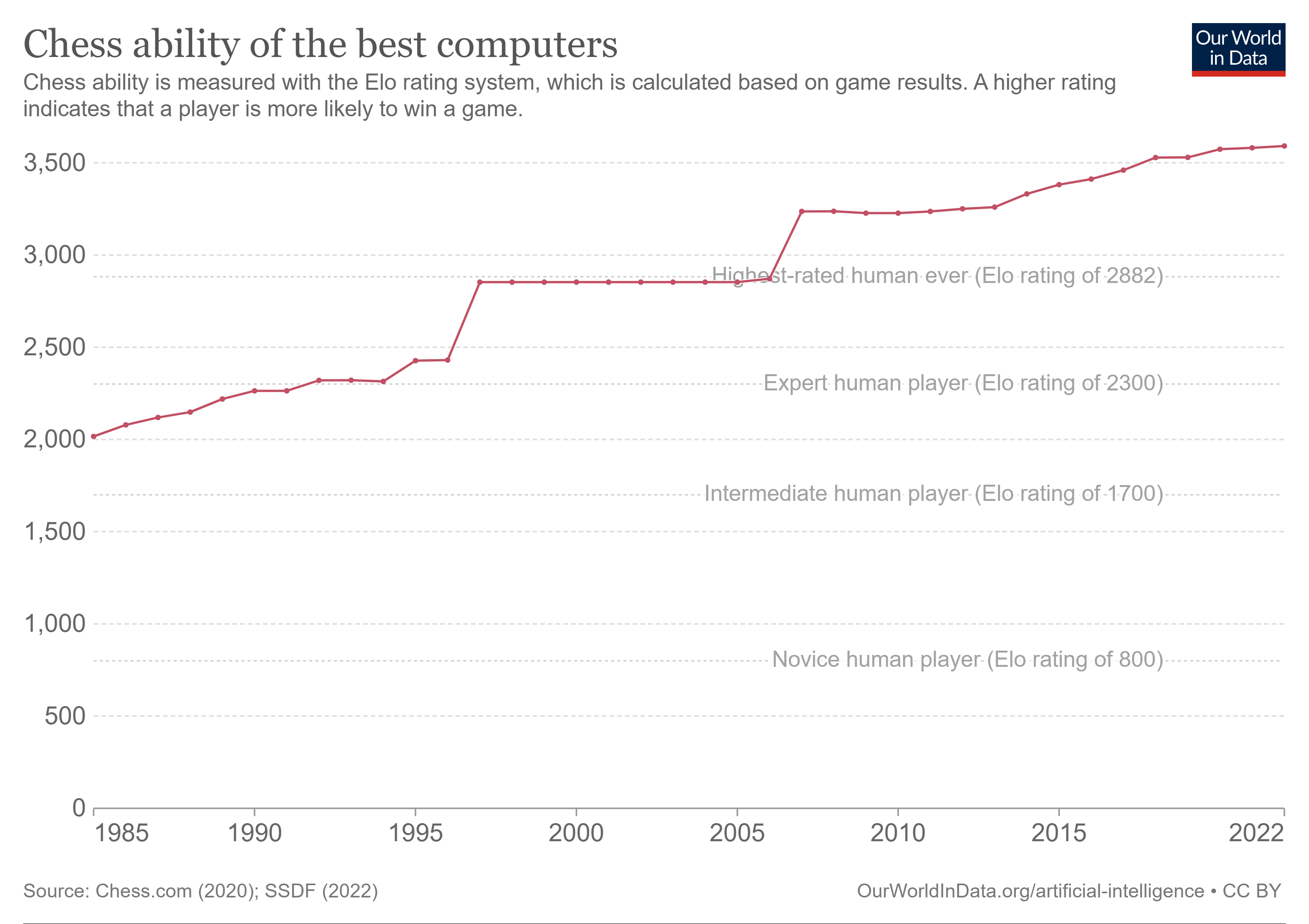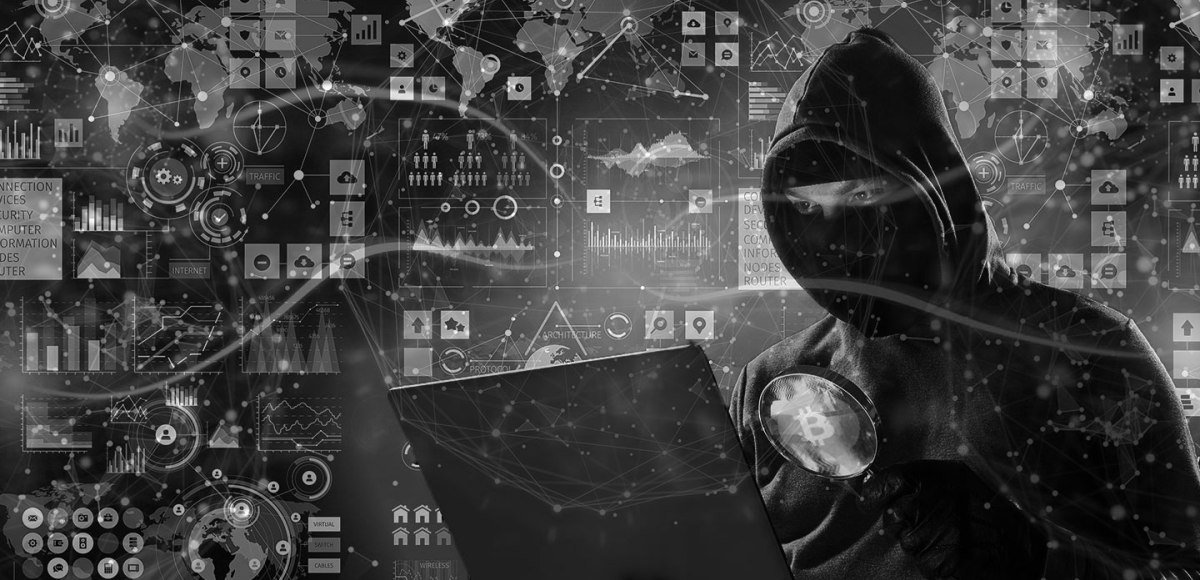Table of Contents
The world of chess is a fascinating arena where artificial intelligence (AI) and human intellect have collided for decades. Magnus Carlsen is the best chess player in the world and the highest rated player of all time. With a top Elo rating of 2,882 (a measure of chess proficiency), he is at the forefront of this complex game.
I recently had the privilege of working with his Coach Peter Heine Nielsen who gave me valuable insights into the evolving dynamic between AI and human intuition in chess.
Since their introduction in the mid-1980s, the capabilities of chess engines have improved rapidly. Her Elo rating is up from around 2,000 in the mid 80’s (a skill level that falls between an intermediate and an experienced human player). 3,610 in 2023 increased. This rating is well beyond the capabilities of any human player, including Carlsen.
sources: Our World in Data
Nielsen, coach of the world’s greatest chess player, is a witness to this change. He says:
“Long gone are the days when humans, even Magnus, could compete with a computer.”
But that doesn’t mean that man was completely checkmated.
World’s Best Chess Player: Navigating Between AI and Intuition
“Computers are tools available to all of us. We don’t compete with them,” says Nielsen. Therefore, AI is used to train players and analyze the game.
However, Nielsen points out an interesting aspect: the enduring value of human intuition and unpredictability. These qualities are key in a game increasingly dominated by machine precision.
“Chess is a game between two people, a game of mistakes under pressure. Magnus might feel that one move gives him the best chance, putting uncomfortable pressure on his opponent, even though the computer might reject it.”
Ultimately, the best chess players in the world, like Carlsen, look for “advantage concepts” – moves that might be moderately discarded by a chess engine but put pressure on an unsuspecting opponent.
“The computer, calculating billions of moves and unperturbed by nerves, could find the right countersequence while a human opponent couldn’t.
So it’s not about outwitting the machine, but about accepting human unpredictability.
“Modern chess is like this: if we all follow what the computer tells us in the analysis, we both have the same source, the same ideas, and the game will be a draw. So let’s try to find concepts on the edge… This is chess. That’s sports.”
Nielsen’s findings underscore the complex dance of man and machine at the highest levels of chess. The strength of computer chess has increased, underscored by the dramatic rise in Elo ratings.
And yet chess is ultimately a human sport – which is why intuition, unpredictability and the potential for error are still important.
Get to know the tools of the best chess player in the world
This human factor is not about ignoring the insights of the AI. In fact, an essential part of Nielsen’s role as a chess coach is in-depth computer analysis.
“Basically everything I do is computer analysis. I pit different computer programs against each other to see where opinions differ and try to learn.”
This approach, especially to opening strategies, is an essential aspect of his work as a coach.
Before each game, Nielsen Carlsen provides a set of AI-generated concepts. Carlsen then evaluates these strategies and chooses which ones to use in his preparation.
Leela (Lc0) and Stockfish are the two main tools used by Nielsen.
Leela
Lc0 0.29.0, or Leela, occupies a special position in the world of chess engines. According to the rating list published by SSDF, as of May 2023, Leela (Lc0 0.29.0 Cuda-808544 3060Ti) currently leading. It is also the first chess program to break the 3,600 Elo barrier.
The Swedish scoring system is based on tournament conditions, which are 40 moves in 2 hours, followed by 20 moves in each additional hour.
Leela’s unprecedented ranking of 3,610 is accompanied by a margin of error of -41 to 45, meaning his actual rating could be anywhere between 3,569 (3,610 – 41) and 3,655 (3,610 + 45). While this massive achievement is impressive, it’s obvious that more games are needed to lower the error bars.
The software’s remarkable performance was achieved against opponents with an average Elo rating of 3,466, resulting in a whopping 68% win rate. Its position as the top rated engine on the SSDF list demonstrates Leela’s considerable ability and influence in the chess world.
It will be interesting to see how the chess engine will fare if it continues to compete against top programs – a crucial factor in its contribution to the performance of the best chess player in the world.
Stockfish
Stockfish a powerful and freely available piece of software, is another staple in preparing the world’s best chess player.
According to the rating list published by the SSDF, Stockfish (Stockfish 15 x64 1800X 3.6 GHz) was in May 2023 fourth among all tested chess engines. However, in June 2023 Stockfish 16 was released which has not yet been ranked.
Stockfish 15 has played a total of 367 games with a win rate of 66%. The average opponent rating is 3,456 Elo. The program has an average Elo rating of 3570 with a margin of error of -36 to 39. This means that its actual rating could be between 3534 (3570 – 36) and 3609 (3570 + 39).
Still, that Elo rating is impressive and puts it in the top four worldwide, proving its robust prowess in the realm of chess.
The bottom line
In the intricate world of chess, the blend of human insight and AI accuracy creates an intriguing dynamic. The world’s best chess player, Magnus Carlsen, embodies this dynamic as he relies on the insights of chess engines like Leela and Stockfish.
Still, Carlsen’s human intuition and unpredictability continue to play a crucial role. This blend of human genius and machine precision is the hallmark of modern chess. Carlsen leverages the insights offered by AI while exploring the uniquely human “concepts of advantage”.
Even as chess engines keep breaking new records, the game is still about the remarkable potential of the human mind.
- A Look Back at Bitcoin’s Historic Year 2024: From ETFs to New All-Time Highs - December 31, 2024
- Ethereum Price Could Skyrocket in 2025: Here’s What Experts Expect 🚀📊 - December 31, 2024
- How Trump’s Politics Could Send Ethereum to the Moon—Or Just to Mar-a-Lago? - December 30, 2024
























